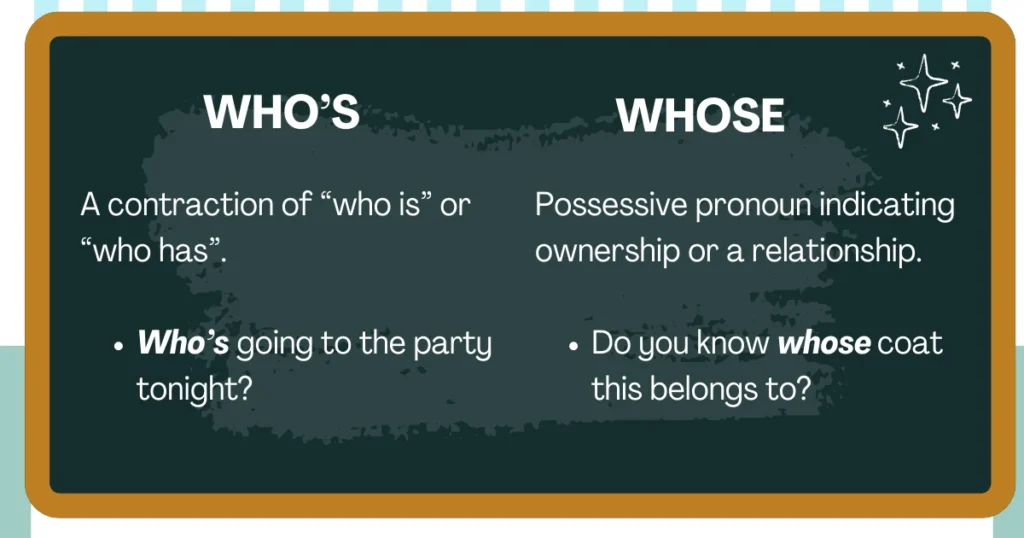Contents
Toggle
Who’s vs. whose
If who’s vs. whose still gets you mixed up—don’t worry, the answer is a matter of a quick lesson in grammar.
“Who’s” and “whose”, explained
Whose and who’s are both forms of the interrogative pronoun “who“, (not the World Health Organization, though they have the same letters).
| word | example |
| Whose (possessive pronoun) indicates belonging | Do you know whose book this is? Whose car is parked in my spot? |
| Who’s (contraction, who + is or has) | Have you heard who’s going to be at the party? Who’s been to this restaurant before? |
The contraction “who’s” (who + is/has)
Who’s with an apostrophe ‘s’ is a contraction that combines the pronoun “who” with the present tense singular form of “to be“, namely is (in the third-person), and has, (third-person present sing. of have).
- [Who + is]: Who’s going to be at the party?; “Guess who’s coming to dinner?”
- [Who + has]: Do you know who’s been here before?; she’s someone who’s always been there for me.
Apostrophe ‘s can indicate possession, (e.g., “Sarah’s jacket”). But an apostrophe ‘s can also be a short form (or contraction) of two individual words. This is how ‘s works in the word (read: contraction) “who’s“.
Keep in mind, when it comes to formal writing, try to avoid using most contractions because it can come across as informal. Apostrophes indicating possession are correct regardless of the tone or application of writing.
How to use whose (possessive)
Whose is the possessive form of who. We use whose to ask about possession or belonging; to specify something we’re referring to, or to provide more information on something or someone:
Whose phone is that on the table?
It’s the house whose door is painted red.
Jake, whose sister is an archeologist, is considering studying the subject as well.
Because “whose” is a possessive determiner, it doesn’t need an apostrophe ‘s to show possession since the noun is already made clear. The other possessive determiners are my, your, his, her, its, our, their, whose.
Also keep in mind that as a possessive pronoun, ‘whose‘ can refer to all types of nouns; e.g., people, places, things, and is not reserved for people only: China is a country whose history fascinates me.
Why do we confuse who’s and whose?
Who’s and whose are homophones in the English language, which are words that sound the same and are pronounced the same, but have different meanings, and should therefore be used distinctly from each other. This is true in the case of who’s and whose, despite both being rooted in the same subject pronoun who.
In review: who’s vs. whose

- Whose is the possessive form of who and asks about ownership or possession.
- Who’s is a contraction of ‘who + is‘ or ‘who + has’, and is commonly used to ask questions.
Pro tip! If you’re unsure whether you’re using either word correctly, try replacing it with “who is” or “who has”. If either work in the context, then the correct spelling is who’s (with the apostrophe s).
Other examples of sentences with “who’s”
“Who’s Afraid of the Big Bad Wolf?”
Who’s been eating my porridge?
Guess who’s coming to dinner tonight?
Do you know who’s going to be at the party?
I have no idea who’s working tomorrow.
Examples of sentences using “whose”
Bernard stood there face to face with Mrs. Vivian, whose eyes seemed to plead with him more than ever.
Polavieja, as everybody knew, was the chosen executive of the friars, whose only care was to secure their own position.
She didn’t know whose car was parked in front of the house.
We wondered whose wallet was left on the bench.
Guess whose son is getting married next month!
Other forms of the pronoun who
- Who’ve = who have. “Who’ve you asked so far?
- Who’ll = who will. “Who’ll be at the party tonight?”
- Who’re = who are. “The film begins with a young couple who’re just about to get married.”
- Who’d = who had or who would. “She wondered who’d sent her the mysterious email.”
What about whom?
The difference between whom, whose and who’s is a bit trickier than just whose and who’s. Whom is the indirect object form of who, and receives the action of the sentence rather than actively performing it, (as in the case of who’s.) For example, in the sentence, “For whom did you knit the sweater?” Whom functions as the sentence object and receives the action of the verb; which, in this case, is the knitted sweater.
The difference between who’s and whose is that who’s is a contraction of who + is or who + has. Example: who’s got the remote? Whose is a possessive pronoun that indicates ownership or possession of an object, idea and so on. Example: whose shoes are these?
Read about nouns in grammar
- What are Common Nouns vs Proper Nouns?
- What are Collective Nouns? (Collective Nouns vs Mass Nouns)
- Plural Only Nouns (Explanation & Examples)
- Abstract Nouns vs Concrete Nouns Explained
- What are Possessive Nouns? (Formation of Possessive Nouns)
Sources
1. Wikipedia contributors. “Guess Who’s Coming to Dinner.” Wikipedia, The Free Encyclopedia. Wikipedia, The Free Encyclopedia, 27 Jan. 2024. Web. 20 Feb. 2024.










